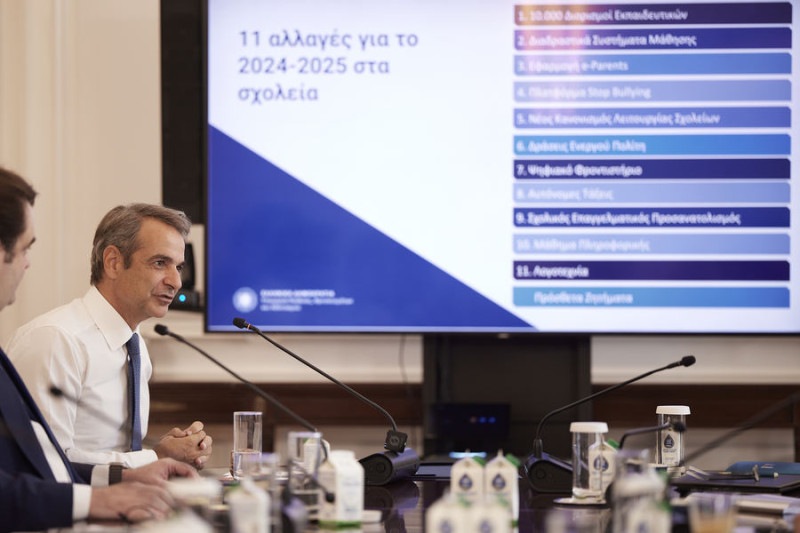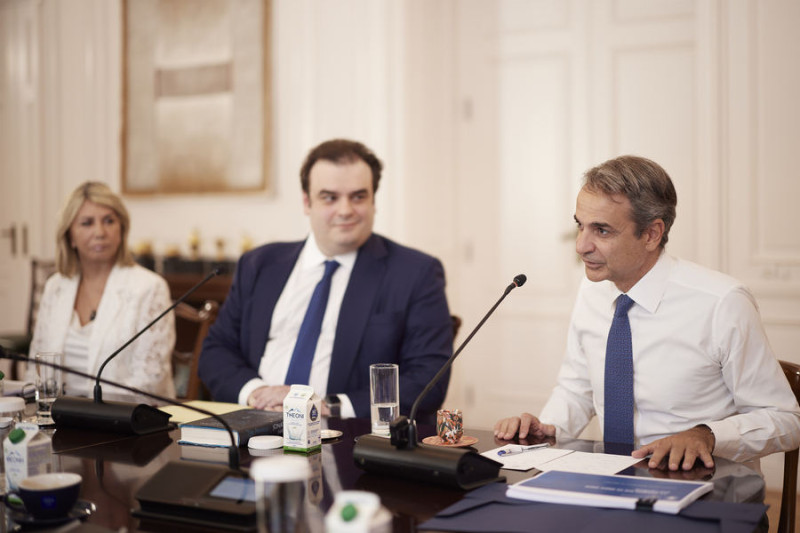Changes in teachers, technology, bullying and mobile phones
The 11 changes that will improve the teaching process and school life in the coming school yearwhich begins on September 11, were presented during a meeting under Prime Minister Kyriakos Mitsotakis with the leadership of the Ministry of Education, Religion and Sports.
During the meeting the Prime Minister stated: “Today we have a meeting with the political leadership of the Ministry of Education, Religious Affairs and Sports to discuss the important changes in our schools ahead of the next school year. If I had to make an attempt to categorize the 11 very important changes, about which the Minister and Deputy Minister will have the opportunity to speak in more detail in the coming days, I would divide them into three distinct categories.
The first concerns human resources: 10,000 new hires of permanent teachers for the next academic year, which are added to the 27,500 recruitments that have already taken place since 2019.
The government’s policy is being implemented with absolute consistency and concerns the gradual replacement of substitute teachers with regular staff, with permanent teachers, with obvious benefits for them as well as for the educational process as a whole.
The second area in which the Ministry invests heavily is overall the technology sector. 28,500 interactive whiteboards have already been installed in the schools of our country, from 5th Primary to 3rd High School, and we expect the installation of the rest until we reach the number of 36,000 by the end of the year.
I want to remind you that this intervention is also an intervention financed by the Recovery Fund and at the same time we significantly enrich the educational content with excellent material, which is now available to teachers so that the lesson from the 5th grade becomes much more meaningful, much more interactive and much more interesting for both teachers and children.
I also want to dwell separately on its application digital tutorialwhich will start operating from September 16 for the children of the 3rd Lyceum. We provide a free digital tutorial with excellent teachers, covering all subjects covered in the national exams. A very useful tool, I believe, for our fellow citizens who do not have the financial means to send their children to tutoring schools, but also for the isolated areas of the country where considerable time and considerable effort is required to move the children, if they wish to they have additional support from a tutoring school.
The third category that I want to dwell on concerns the issues of educational process and behaviors in general. His platform stop-bullying has already borne fruit and I believe that it is a very important tool at the disposal of students and teachers in order to be able to highlight such incidents and to be able to manage them with discretion and efficiency, preferably within the school unit.
But I also want to dwell on the more general changes we are making in behavioral matters. Some would call it a tightening, I would call it a streamlining of how we deal with delinquent behavior in school. It is something that both teachers and parents have been asking us to do. The reinstatement of, let’s say, the five-day suspension or, in exceptional cases, the change of school environment, we consider to be interventions which in the current situation are absolutely imperative.
I also want to stop and congratulate the Ministry for the fact that we are constantly enriching the educational work with actions that make our students more active citizens. And I am glad because these actions now find their place at the core of the educational process.
As I am particularly happy about the fact that within the year we will add career guidance services for the children of the 1st Lyceum, with special skills tests so that we can make it easier for children at this critical age to realize what their skills really are and begin to steer them towards career paths that are more in line with their inclinations, interests and talents .
Finally, I want to make a special mention of a great effort, which we will start this year essentially and in which we want the support of all students, parents, and teachers. And this effort has to do with the fact that mobile phones should not have a place in schools. The student may bring the cell phone to school, but it must be in the bag during the entire school day.
And the reason why we want to be very persistent in this effort is very simple. The scientific data now on how the use of mobile phones during the day at school affects the learning process itself is catalytic. From distraction to other important issues it is clear that the cell phone has no place in school during the day.
“The cell phone in the bag”, therefore, it is the slogan with which we want schools to open this academic year. It’s a new effort. I want to emphasize that many European countries are moving in this direction. We do not necessarily have the requirement to have 100% compliance from the first moment, but we want to explain to children and parents and teachers why it is important that the student at school is absolutely committed to the educational process.
By using tabletswhenever needed, but without the distraction that unfortunately inevitably occurs when students spend long hours on social media platforms. And I think all parents totally understand what I’m saying.
So we start this great effort at the beginning of the new school year and I believe that it is something that can only have positive benefits overall for the educational process in our schools.
So the Minister, the Deputy Minister will have the opportunity in the next few days, in much more detail, to present the innovations of our schools for the next school year. Once again, I would like to congratulate all the leadership of the Ministry of Education for the very important work that is being done in this field.”
Perrakakis: It is the beginning of a series of very big changes
For his part, the Minister of Education, Religious Affairs and Sports Kyriakos Pierrakakis stated: “Mr. President, 11 changes that we had the opportunity to present to you today and that you just mentioned are changes that parents, teachers and primarily students will see from the start of this school year and it is the beginning of a series of very big changes .
This year, as is the direction you have given us, will be “the year of the school”, there will be a series of reforms that will concern the school as a whole. These are all those which are already ready to start from the beginning of this year. More will be added along the way, according to the directions you’ve given us.
And just a very brief reference to the last piece that you mentioned, which is the ban on the conspicuous possession and use of cell phones in schools, which is essentially in addition to all of the precedents that we’ve had the opportunity to present in the past together.
It is something that all the international literature emphasizes that should be done in schools. It is something that we see many other countries of the European Union and internationally implementing one after the other. It also has to do with guidelines given by UNESCO.
And allow me, Mr. President, to close with a personal reference, given that we are proceeding with this ban on conspicuous possession. I want to believe that I am the last Minister to whom you would put the term “technophobic”. So in that sense, I think it’s something that’s now generally accepted among the people who are handling this issue that it has to happen and we’re going to make sure it’s done with the best possible condition and care.”
The 11 changes that the 2024-25 school year brings
As it was pointed out in the context of the meeting, for the school year 2024-25 there have still been 10,000 appointments of permanent teachers of all specialtieswith the result that from 2019 until today the teaching staff of public schools has been strengthened with more than 37,500 teachers and professors.
At the same time, there was an overview of the new teaching tools that are being launched this year. The pilot live deliveries of the free digital tutorial they will begin on September 16 for the nationally examined courses, while the asynchronous reinforcement traditions section has already been put into operation for all students, in the first phase for the courses of the modern Greek language and mathematics in the three classes of the High School. By the end of 2025, 2,500 easy-to-understand, concise videos will have been posted for 47 subjects taught from 5th grade to 2nd high school, plus materials for high school history and math.
In addition, the new school year will be activated for the first time autonomous classes for remote areas, starting from Gavdos, where three teachers will teach the main courses live, while the rest of the deliveries will be made live via video conference.
As for her utilization of new technologies in the course, it was emphasized that the installation of interactive digital whiteboards for the needs of all classes from 5th Primary to 3rd High School has now been completed at a rate of 78.6%, with 28,504 devices already in school classrooms.
At the level of contact with parents and the fight against school bullying, during the meeting it was noted that on the platform stop-bullying.gov.gr 1,433 profiles have now been created and over 300 reports submitted.
At the same time, through the application e-Parents parents and guardians they are informed about the children’s grades and about announcements issued by the school unit, while very soon the additional possibility of informing them about absences, material and planning meetings with teachers will be activated.
Special reference was made to the new operating regulation of the schools, which includes the new framework of consequences. Among other things, Greece is added to the list of European countries taking measures against the use of mobile phones in school, prohibiting the visible possession and use of mobile phones, providing for increased penalties in cases where a student records his classmates or teachers without consent.
The eighth change concerns the enrichment of the curriculum with Active Citizen Actionswhich are linked to the sustainable development goals set by the UN. The purpose is for students to be trained in healthy living, caring for the environment, social responsibility and creative thinking.
Also, starting from the new school year, the IT course in High School is being reformed with an update of the content of the books and the design of a new IT certificate, which is structured in four axes: fundamentals of computing, data manipulation and analysis, internet and networks, ethical/social aspects.
At the same time, in 1st year of high school, the school vocational orientation is introduced online, in order to support students to discover their talents and inclinations.
Weight is also given to its reinforcement love of reading. In all classes, from kindergarten to 3rd high school, the reading, with assignments and activities, of entire literary works by leading Greek and foreign authors is introduced, instead of the fragmentary texts that were done until last year. The aim is to encourage and support students to love books and develop critical thinking. Towards this end, the multiple book is being promoted, which students will have at their disposal from April 2025, initially in digital format.
Source: Skai
I have worked in the news industry for over 10 years. I have been an author at News Bulletin 247 for the past 2 years. I mostly cover politics news. I am a highly experienced and respected journalist. I have won numerous awards for my work.












